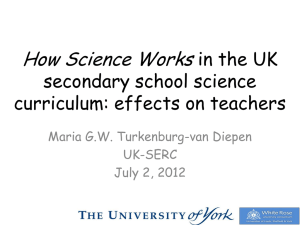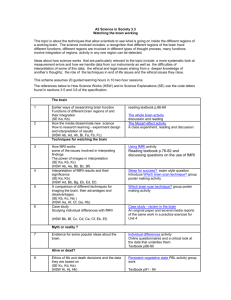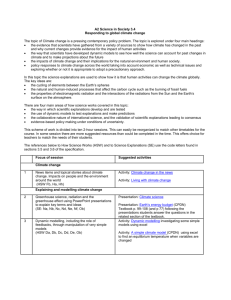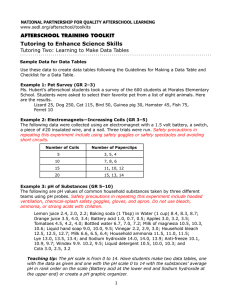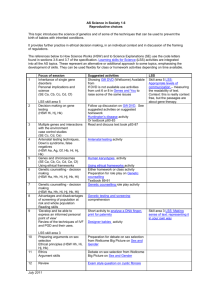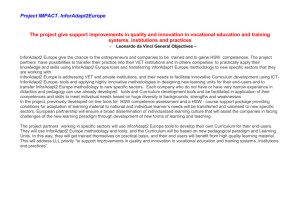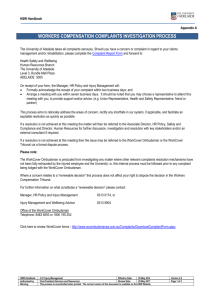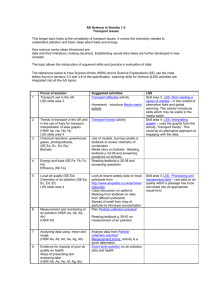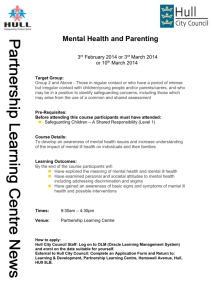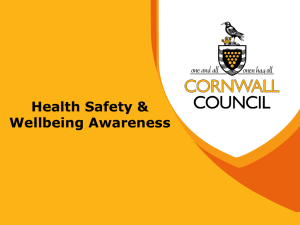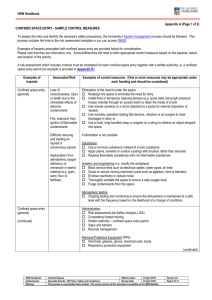How Diagnose and Treat supports subject, skills
advertisement
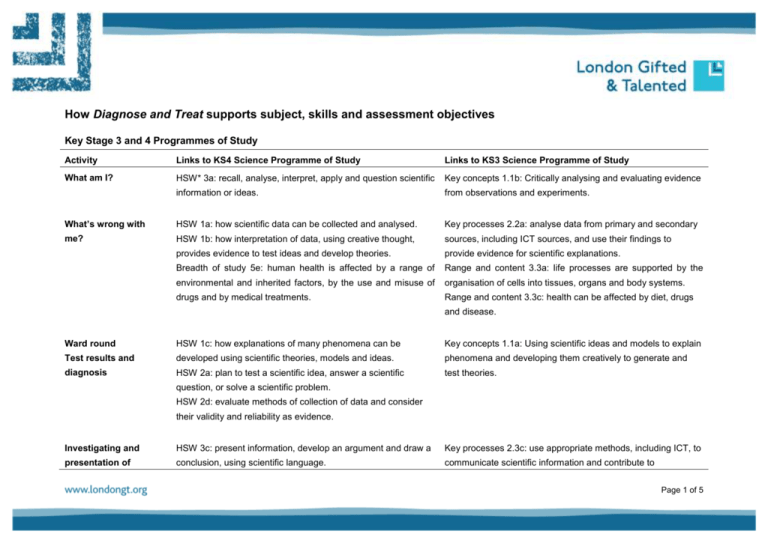
How Diagnose and Treat supports subject, skills and assessment objectives Key Stage 3 and 4 Programmes of Study Activity Links to KS4 Science Programme of Study Links to KS3 Science Programme of Study What am I? HSW* 3a: recall, analyse, interpret, apply and question scientific Key concepts 1.1b: Critically analysing and evaluating evidence information or ideas. from observations and experiments. What’s wrong with HSW 1a: how scientific data can be collected and analysed. Key processes 2.2a: analyse data from primary and secondary me? HSW 1b: how interpretation of data, using creative thought, sources, including ICT sources, and use their findings to provides evidence to test ideas and develop theories. provide evidence for scientific explanations. Breadth of study 5e: human health is affected by a range of Range and content 3.3a: life processes are supported by the environmental and inherited factors, by the use and misuse of organisation of cells into tissues, organs and body systems. drugs and by medical treatments. Range and content 3.3c: health can be affected by diet, drugs and disease. Ward round HSW 1c: how explanations of many phenomena can be Key concepts 1.1a: Using scientific ideas and models to explain Test results and developed using scientific theories, models and ideas. phenomena and developing them creatively to generate and diagnosis HSW 2a: plan to test a scientific idea, answer a scientific test theories. question, or solve a scientific problem. HSW 2d: evaluate methods of collection of data and consider their validity and reliability as evidence. Investigating and HSW 3c: present information, develop an argument and draw a Key processes 2.3c: use appropriate methods, including ICT, to presentation of conclusion, using scientific language. communicate scientific information and contribute to Page 1 of 5 treatment plans HSW 4b: to consider how and why decisions about science and presentations and discussions about scientific issues. technology are made, including those that raise ethical issues, and about the social, economic and environmental effects of such decisions. *HSW = How science works GCSE Science specification criteria assessment objectives Activity Links to GCSE assessment objectives used across exam board specifications What am I? AO1a: demonstrate knowledge and understanding of the scientific facts and concepts. AO2a: apply concepts, develop arguments or draw conclusions related to familiar and unfamiliar situations. What’s wrong with me? AO1b: show understanding of how scientific evidence is collected and its relationship with scientific explanations and theories. AO3c: analyse and interpret qualitative and quantitative data from different sources. Ward round AO2a: apply concepts, develop arguments or draw conclusions related to familiar and unfamiliar situations. Test results and diagnosis AO2b: plan a scientific task, such as a practical procedure, testing an idea, answering a question or solving a problem. AO3 b: evaluate the methods they use when collecting first-hand and secondary data. AO3 d: consider the validity and reliability of data in presenting and justifying conclusions. Investigating and AO2c: show understanding of how decisions about science and technology are made to different situations, including presentation of treatment contemporary situations and those raising ethical issues. plans AO2d: evaluate the impact of scientific developments or processes on individuals, communities or the environment. 116105166 Page 2 of 5 QCA GCSE Science grade A description Candidates demonstrate a detailed knowledge and understanding of science content and how science works, encompassing the principal concepts, techniques and facts across all areas of the specification. They use technical vocabulary and techniques with fluency, clearly demonstrating communication and numerical skills appropriate to a range of situations. They demonstrate a good understanding of the relationships between data, evidence and scientific explanations and theories. They are aware of areas of uncertainty in scientific knowledge and explain how scientific theories can be changed by new evidence. Candidates use and apply their knowledge and understanding in a range of tasks and situations. They use this knowledge, together with information from other sources, effectively in planning a scientific task, such as a practical procedure, testing an idea, answering a question, or solving a problem. Candidates describe how, and why, decisions about uses of science are made in contexts familiar to them, and apply this knowledge to unfamiliar situations. They demonstrate good understanding of the benefits and risks of scientific advances, and identify ethical issues related to these. They choose appropriate methods for collecting first-hand and secondary data, interpret and question data skilfully, and evaluate the methods they use. They carry out a range of practical tasks safely and skilfully, selecting and using equipment appropriately to make relevant and precise observations. Candidates select a method of presenting data appropriate to the task. They draw and justify conclusions consistent with the evidence they have collected and suggest improvements to the methods used that would enable them to collect more valid and reliable evidence. 116105166 Page 3 of 5 Personal, learning and thinking skills Activity Links to personal, learning and thinking skills What am I? Creative thinkers: generate ideas and explore possibilities ask questions to extend their thinking try out alternatives or new solutions and follow ideas through. What’s wrong with me? Independent enquirers: identify questions to answer and Creative thinkers: problems to resolve question their own and others’ assumptions. analyse and evaluate information, Independent enquirers: support conclusions, using Team workers: reasoned arguments and evidence. adapt behaviour to suit different roles and situations, including leadership roles. Test results and diagnoses Creative thinkers: adapt ideas as circumstances Reflective learners: change. review progress, acting on the outcomes invite feedback and deal positively with praise, setbacks and criticism set goals with success criteria for their development and work. 116105166 Page 4 of 5 propose practical ways forward, breaking these down into manageable steps. judging its relevance and value. Ward round Effective participators: Activity Links to personal, learning and thinking skills Treatment plans Independent enquirers: Team workers: plan and carry out research, appreciating the consequences of decisions explore issues, events or problems collaborate with others to work Self-managers: towards common goals initiative, commitment and reach agreements, managing perseverance discussions to achieve results. from different perspectives work towards goals, showing organise time and resources, prioritising actions. consider the influence of circumstances, beliefs and feelings on decisions and events. Presentations and plenary Reflective learners: assess themselves and others, Team workers: identifying opportunities and achievements evaluate experiences and learning to inform future progress communicate their learning in relevant ways for different audiences. 116105166 Page 5 of 5 take responsibilility, showing confidence in themselves and their contribution provide constructive support and feedback to others. Effective participators: present a persuasive case for action.
